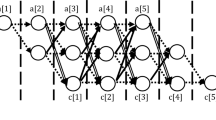Abstract
In this paper we consider classical shop problems:n jobs have to be processed onm machines. The processing timep i,j of jobi on machinej is given for all operations (i, j). Each machine can process at most one job at a time and each job can be processed at most on one machine at a given time. The machine orders are fixed (job-shop) or arbitrary (open-shop). We have to determine a feasible combination of machine and job orders, a so-called sequence, which minimizes the makespan.
We introduce a partial order on the set of sequences with the property that there exists at least one optimal sequence in the set of minimal elements of this partial order independent of the given processing times. The set of minimal elements (set of irreducible sequences) can be in detail described in the case of the two machine open-shop problem. The cardinality is calculated. We will show which sequences are generated by the well-known polynomial algorithms for the construction of optimal schedules.
Furthermore, we investigate the problemO∥C max on an operation set with spanning tree structure.
Similar content being viewed by others
References
Ashour S (1972) Sequencing theory. Springer Verlag
Akers SB, Friedman J (1955) A non-numerical approach to production scheduling problems. Oper Res 3:429–442
Bräsel H (1990) Latin rectangle and scheduling theory (in German). Habilitationsschrift TU Magdeburg
Bräsel H, Kleinau M (1992) On the number of feasible schedules of the open-shop-problem — an application of special latin rectangles. Optimization 23:251–260
Bräsel H, Kleinau M (1992) On number problems for the open-shop problem. System Modelling and Optimization, Proceedings of the 15th IFIP Conference, 145–155, Springer Verlag
Bräsel H, Kluge D, Werner F (1994) A polynomial algorithm for the [n/m/O, t ij ,tree/C max ] open-shop problem. Europ J of Oper Res 72:125–134
Bräsel H, Kluge D, Werner F (1994) A polynomial algorithm for an open-shop problem with unit processing times and tree constraints. To appear in Discrete Applied Mathematics
Bräsel H, Tautenhahn T, Werner F (1993) Heuristic constructive algorithms for them¦n¦O¦C max problem. Computing 51:95–110
Conway RW, Maxwell WL, Miller LW (1967) Theory of scheduling. Addison-Wesley
Gonzales T, Sahni S (1976) Open-shop scheduling to minimize finish time. J Assoc Comput Mach 23:665–679
Graham RE, Lawler EL, Lenstra JK, Rinnooy Kan AHG (1979) Optimization and approximation in deterministic sequencing and scheduling — A survey. Ann Discrete Mathematics 5:287–326
Kleinau M (1993) On the structure of shop scheduling problems: Number problems, reducibility and complexity (in German). Dissertation TU Magdeburg
Lawler EL, Lenstra JK, Rinnooy Kan AHG, Shmoys DB (1993) Sequencing and scheduling: Algorithms and complexity. In: Graves SC et al (eds) Handbooks in Operations Research & Management Science 4:445–522
Tautenhahn T (1994) Open-shop problems with unit processing times (in German). Dissertation Otto-von-Guericke-Universitt Magdeburg
De Werra D (1990) Almost nonpreemptive schedules. Ann Oper Res 26:243–256
Author information
Authors and Affiliations
Additional information
Supported by Deutsche Forschungsgemeinschaft, Project ScheMA
Rights and permissions
About this article
Cite this article
Bräsel, H., Kleinau, M. New steps in the amazing world of sequences and schedules. Mathematical Methods of Operations Research 43, 195–214 (1996). https://doi.org/10.1007/BF01680372
Issue Date:
DOI: https://doi.org/10.1007/BF01680372




